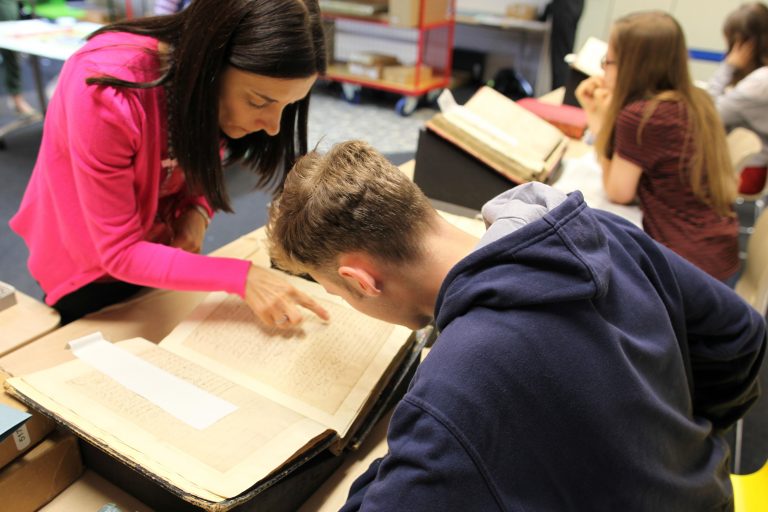Our year as The National Archives-Research Library UK (RLUK) Professional Fellows 2018-19 has come to an end. One of us (Rosie Morris) worked with Durham University’s 4Schools service at Palace Green Library on her topic of ‘Examining best practice of Archives and Libraries in making Medieval and Early Modern collections accessible in school-aged and first-year undergraduate education’, while the other (Melinda Haunton) worked with the University of York’s Borthwick Institute for Archives and Institute for the Public Understanding of the Past, to look at ‘Collections, audiences and impact: lessons from public history’.
We have blogged individually about our progress and processes, so if you’re interested in opening up original records in education work, or understanding the impact of working with wide audiences in archives and special collections, do have a look. But we wanted to share this final blog to reflect on how our fellowships went. This is the first year of the programme, and we have enjoyed being the guinea pigs!
How did the fellowship go for you?
Melinda: I think it was a much freer, more flexible experience than we had expected. Neither of our projects went exactly as anticipated, but we were both able to tailor them to our specific areas of interest and to the themes that emerged during research.
Rosie: I had expected to work more on digital access, which is closer to my core role, but in the end there was a huge amount to cover from my original proposal. I decided to focus on in-person use of sources first, to be sure of my ground. But as my fellowship ends, I’m now working on some digital resources to take this forward.

A teacher helps a student working with a Tudor document
Melinda: I had thought I would perhaps find more structured ideas about audience development in my reading, but I ended up discovering much more about public history as practice. So that re-framed what my final product could be. It also meant I was able to talk at a professional conference about the value of identifying archivists as also public historians. I’ve ended by producing a piece of guidance for use by the archives and special collections sector, which was always my aim. It has ended up as a set of principles for public history with archives and special collections, and a schematic for understanding impact.
Rosie: The placement aspect of the fellowship was a bit more complicated than expected, probably because it was the first time the fellowship has run. We’ve fed that back to the Fellowship Board, so next year’s fellows have a different mentoring arrangement. It is really valuable to see other institutions and how they work as a core part of the fellowship, and to share expertise across institutions.
What’s next for your work?
Melinda: I’ve put the first draft guidance out for consultation and got fantastically useful feedback, so I will be using that to make a second draft much stronger. As I’m working on principles rather than procedural guidance, I’ve also realised there is no such thing as a final product – I intend to keep on revisiting these as new issues arise. I’m also going to write a journal article about the connections between public history and archives, so that I can share some thinking about interplays between our disciplines. I think that works better as an analytical article than included in practical guidance.
Rosie: Some of the resources that I’ve created and tested on site will be online for schools and other archives and libraries to use with their documents. Very soon we’ll be launching resources around the Dissolution of the Monasteries, and we will continue to roll out other subjects over time.
I want to encourage other libraries and archives to make their older documents accessible to schools. I’m also aiming to write a journal article, targeted at a teaching journal, to raise teachers’ confidence in using documents with their students. As part of my partnership with Durham University, I met Jenny, one of their team. She is one of the 2019-20 fellows, and will be looking at how to bring documents into secondary schools.
So there’s a thread in the fellowships which will continue to explore using documents in education, and Jenny will be coming to The National Archives to work on this with us. It will be good to keep up that connection.
What will you remember most?
Melinda: I’m not going to forget being in York during the Jorvik Viking Festival! It wasn’t only the sight of queuing Viking warriors waiting for the lights to change at a pelican crossing (though that was particularly memorable). But the festival theme of Viking women directly challenged the clichéd popular image of Vikings and enabled the festival events to talk about their culture and lives in unexpected ways. The whole festival brought public history to life, and reminded me how much appetite there is to learn about the past, in multiple different ways.

The packed Viking market in the medieval Merchant Adventurers’ Hall
Rosie: While in Durham I was taken to see some of their amazing archive material, and really experienced again the ‘wow factor’ of directly encountering primary sources. That epitomised what I am trying to bring to students as well: facilitating a ‘wow’ experience, and being able to read words from the past themselves. It was good to have a chance to feel that for myself again!
